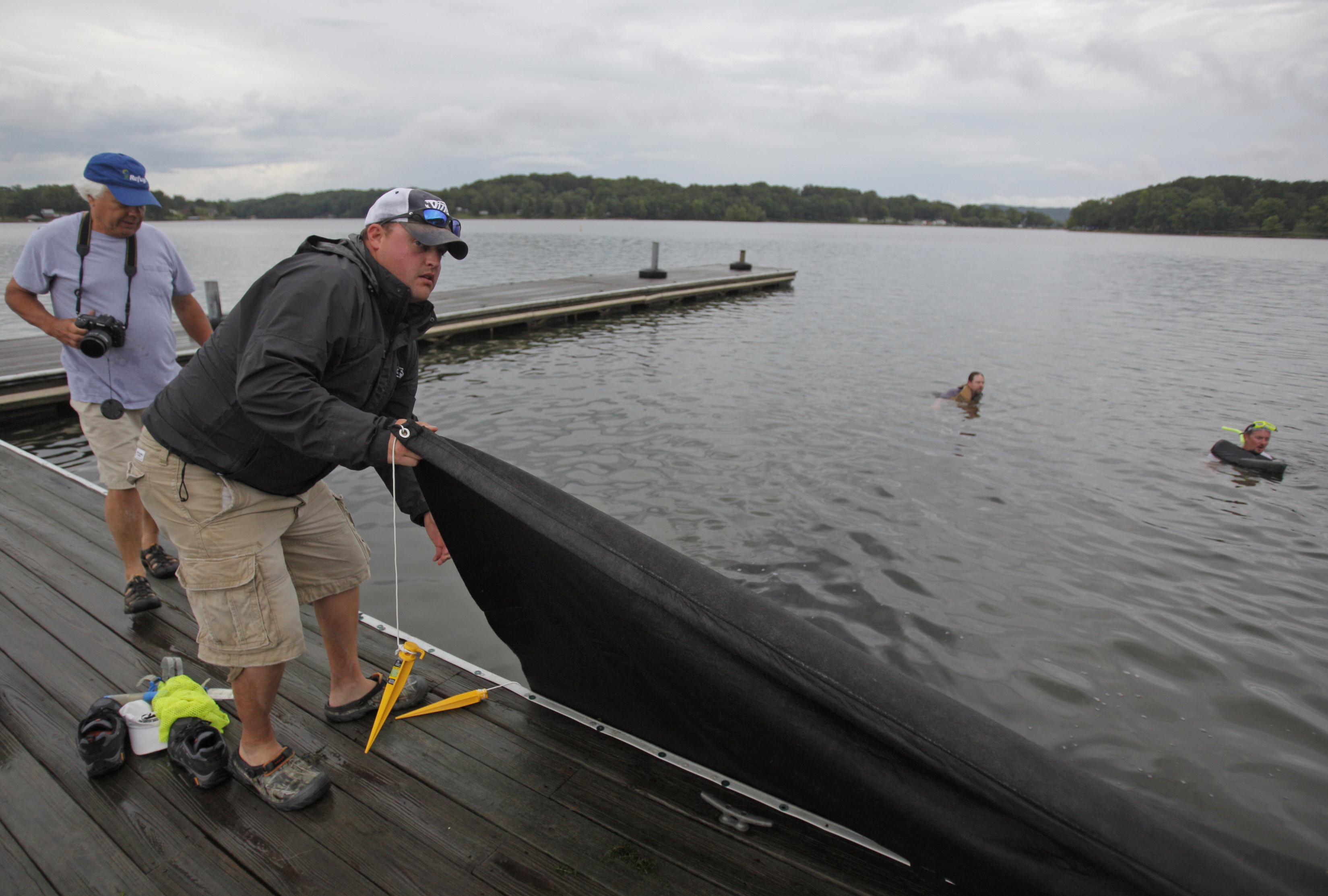Whacking water weeds
Monday, June 27, 2011
Justin Medley leaps more than neck deep into Dallas Bay, dragging behind him what he hopes is a viable answer to a serious problem.
Just below the water surface at Chester Frost Park in Hixson lurks what some see as an aquatic menace that is getting worse every year, state and federal officials say.
Nonnative water plants - hydrilla and Eurasian watermilfoil - are clogging areas around docks, swimming areas and boat ramps. A number of people are seeking solutions to the growing problem.
Medley, president of the Chattanooga Bass Association, and fellow members hope to demonstrate the effectiveness of a nonchemical weapon against weeds.
It's a synthetic barrier material not unlike landscaping mesh, which he called "bottom mats." It kills existing vegetation and blocks light that makes weeds grow.
On Wednesday, six to seven men put down four 12- by 30-foot bottom mats, weighted with steel bars, in about 7 feet of water alongside the boat docks at Chester Frost Park.
The installation was a struggle, but a couple hours' work had the mats spread on the lake bottom. All agreed installation would be far easier in the winter when water levels are low.
Medley contends the underwater vegetation is why fishing is "getting better and better" on Chickamauga Lake.
Bass Association members fear herbicides could hurt fishing habitat, angler and association member Chris Coleman said.
"There's a difference between control and eradication," said Coleman, who doesn't want to see fishing curtailed by weed treatments.
"Ten years ago you could come over here to these boat ramps and you might see 10 vehicles fishing on a weekend," he said. "You come over here today, the way the fishing's been, and the parking lot's full."
ANGLING ACTIVITY
Medley said fishing has increased on Chickamauga Lake despite a national drop in licenses issued for fishing and hunting. Local numbers show anglers from across the region and the country are coming here because fish are plentiful, he and Coleman said.
As the synthetic weed barrier was put down at Chester Frost, Tennessee Valley Authority officials sprayed aquatic herbicide in public-use areas elsewhere on the lake.
Also last week, Alabama biologist Troy Goldsby, owner of Aquatic Services Inc., began weed treatments on Chickamauga Lake under permits issued June 7 by the Tennessee Department of Environment and Conservation.
The permits cover lakefront property owners who joined resident associations that Goldsby formed for Chickamauga, Nickajack, Pickwick and Kentucky lakes on the Tennessee River.
Dick Urban, with TDEC's water pollution control division, said the nonchemical bottom mats can be effective but hard to maintain.
"It's not that they don't work," Urban said recently. "They have specific areas that they will work better in, but in other areas they create as much of a problem as they are trying to solve."
Medley said he's next going to test harvesting to control weeds. He and association members will cut the plants and haul them ashore to dry, he said. Cut pieces allowed to drift simply could take root elsewhere, he said.
"Harvesting aquatic plants is hard work, regardless of the methods used," Urban said. "Aquatic plants are 95 percent water, so they will not dry quickly, [and] they do develop an unpleasant odor when moved on shore.
"Nonchemical control methods do exist but require considerable effort if they are to be effective," he said. "Chemical treatment is essentially mowing with an herbicide."

